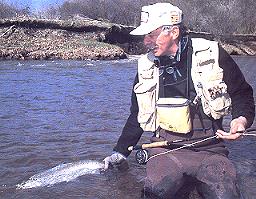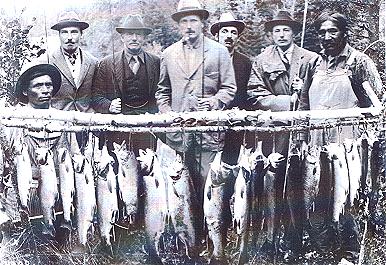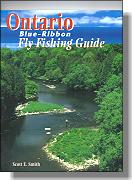Blue Ribbon Fly Fishing in Ontario
By Scott E. Smith
Excerpt from, Ontario, Blue-Ribbon Fly Fishing Guide
Published by: Frank Amato Publications, Inc.
P.O. Box 82112, Portland Oregon 97282 Phone: 503-653-8108,
email Frank Amato Publications
Ontario, one of Canada's ten provinces, stretches from longitude 82
and latitude 42 at its extreme southeastern tip near Leamington Ontario at
Point Pelee National Park - the most southerly point in Canada - to
longitude 88 and latitude 56 at its extreme northwestern corner; spanning
a total of 1,068,580 square kilometers. Within the confines of this vast
tract of land one finds a multitude of extremes in weather, geography and
wildlife, including fish. To be exact 158 species of fish. From large
coastal brook trout rivers sweeping throught the tundra of the far north
towards Hudson Bay; to farm meadow brooks stocked with brown trout
gurgling under highway bridges along the Queen Elizabeth Way near
metropolitan Toronto - it is all one place: Ontario. From garpike to
largemouth bass; from arctic char and grayling to muskellunge and
Northern Pike, steelhead, salmon (both Atlantic and Pacific), brook
trout, brown trout and a whole lot more; they are all here to be pursued
with a fly rod.

Ten million people live in Ontario - a full third of Canada's
population. But to be specific, the greatest majority of these people
live in the southern belt of the province within fifty miles of the U.S.
border. In the remaining tracts of sparsely populated wilderness, countless
streams, rivers, lakes, ponds and creeks are found. The average
population density in Ontario is 9.4 persons per square kilometer.
This means that in many remote areas of the province the population
of black bears likely exceeds that of humans. And black bears do
little fishing.

Ontario's fishing resources were first tapped into by British
Royalty around the turn of the last century. Its lake and rivers were
touted by the Canadian Pacific Railway and the Canadian National
Railway for their trophy fish and unspoiled wilderness to wealthy
European tourists. Since then millions of people, both resident
and non, have enjoyed Ontario's fishing. The world-record brook trout
was caught in Ontario waters; world-record muskellunge - yet to be caught -
roam in some of her lakes; and world-class fishing for smallmouth bass,
northern pike, steelhead, brook trout and brown trout can be readily
obtained by the fly angler. One just needs a little direction on where to
begin.
The primary purpose of Ontario Blue-Ribbon Fly
Fishing Guide is to serve as a guide for the fly angler.
Few, if any, guide books have been written about an area that is
so vast and diverse. Subsequently the book is not a systematic
run-down of every fishable piece of water in the province: This
would be a prodigious task resulting in a book thousands of pages
long, and too expensive for the average angler to purchase. Rather,
Ontario Blue-Ribbon Fly Fishing Guide is meant to
serve as a guide to the premier fly-fishing opportunities in the province.
As fly angling is no longer focused on trout and salmon angling, as it
once was, the book will also cover some of the more popular warmwater
species that have proven worthy opponents on a fly rod. Nonetheless,
coverage of salmonid fly fishing has been apportioned aptly to reflect
their popularity with most fly anglers.
In identifying which areas to cover in this book, the following
criterion was applied to ascertain whether or not the opportunity
was worthy of mention: Accessibility; promimity to/and availability
of guide services, fly shops and outfitters; esthetic acceptability;
and ability to withstand considerable fishing pressure - either by
the existence of special regulations, remoteness, agressive stocking
programs, or the sheer abundance of fish. I also felt that species of
fly-rod-amicable game fish that were unique or unusual to Ontario
deserved mention; for example the aurora trout and the garpike.
Without sounding too apologetic, it is impossible to give due credit
to all fly-fishing opportunities in the province in one publication;
rather, the primary objective here is to provide a guide to the highights,
and to serve as a base on which to expand.
To put the size of the Province of Ontario into perspective, visualize
the states of Texas, Minnesota and Michigan combined and placed on
top of Ontario: they would just fit. The countries of England, France
and New Zealand would also work for this equation.
To add to the size delemma, Ontario is inundated with lakes and rivers.
Looking from a satellite, one would notice Ontario is ribboned with
rivers, streams and creeks along the shores of the Great Lakes and
along Hudson Bay and James Bay coast. The northern part of the
province is jewelled with legions of blue diamond-like lakes embedded
in Canadian Shield. Consider Michigan: truly a fly-fishing paradise,
blessed with many beautiful trout streams flowing into the Great Lakes
Basin. Ontario is seven times that of Michigan in area.
I can vaguely recall as a young boy, my dad's '52 Pontiac sitting at the
back of our home in Winnipeg, Manitoba. The Manitoba license plate
on the back of this round, green automobile, bore the catch phrase "Land
of 100,000 Lakes." This was in direct retort to Minnesota's license plate
that at the same time boasted "Land of 10,000 Lakes." It was rumored
that Ontario put an end to this friendly competition by threatening to
manufacture license places that read "Land of 250,000 Lakes."
All things considered: Ontairio is a fly-anglers paradise. No matter where
you are in the province, you can rest assured that there is some respectable
fly fishing to be had nearby. Even if you are in downtown Toronto, with a
metropolitan population of nearly three million people, the fly-fishing
afictionado can find solicitude knowing that somewhere nearby are some
rising trout or migrating steelhead. In direct contract, those anglers that
have answered the call of the North and travelled to perhaps the shores
of Lake Superior or the catchment streams of Hudson Bay, are really in
no-man's land. This cornucopia of opportunity and variety of species,
no matter where you travel, is where Ontario's wealth in fly-fishing experiences
exist. There is so much to explore and so much to learn about that it boggles
one's mind. You may choose to stay in a comfortable inn or hotel in a quaint
Northern Ontario town and spend your days trekking streams and lakes
teaming with wild brook trout. You may be in Toronto on business or
perhaps catching a Leafs or Blue Jays game, and still within an afternoon -
on an hour depending on the season - be into some dynamite fly-fishing
action. After filling your boots (or waders) with streamside pleasures,
you can then return to the city for a gourmet meal, and Phantom
of the Opera at Pantages Theater. If you are the be-one-with-nature
type, you can go the way of the true pioneer: Carrying all your provisions on
your back or in a canoe, and really experience the wilderness of Ontario.
If you choose this route take warning: Come prepared. There are no fly
shops in Quetico Park in case you run out of tippet material. There are no
phones or electricity in much of Ontario's far north. Forgetting to pack
your fly reel or breaking a rod takes on a whole new meaning when you are
floating down the Winisk River two hundred miles from Hudson Bay,
sixty miles from the nearest phone and three-hundred miles from the nearest
fly shop.
In many ways fly fishing has been slow to arrive in Ontario. Fly fishers being
somewhat of a anomaly; I attracted strange looks and comments from other
anglers when I first began plying the waters near my home town of Thunder
Bay with a fly rod. Fly fishing is an old sport, but in some circles a forgotten
one. But as the popularity of fly fishing spreads across North America, more
and more people are digging their ancient fly gear out of the attic or dropping
a few dollars at the nearest fly shop. For those folks and those that are "old-hat"
at the sport, Ontario lies in waiting - like a new frontier - for those who will
cast her waters.

Next time Coastal Waters! ~ Scott E. Smith
Our Man In Canada Archives
|







